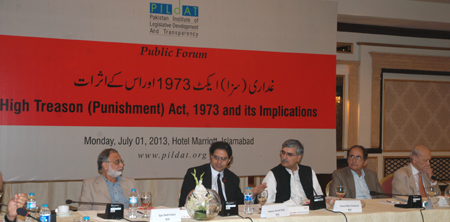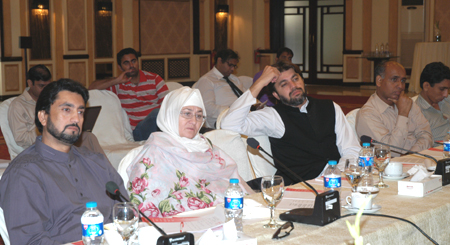| |
Islamabad; July 01; There was a general consensus in the PILDAT Public Forum on �High Treason (Punishment) Act 1973 and its Implications� that the Federal Government should pursue the High Treason Case against General (Retired) Pervez Musharraf but it should be handled carefully with complete fairness and without any hint of ridicule to any state institution. Rule of Law is the most important principle to uphold in a civilized society and the prime objective of the case should be to establish the principle of supremacy of rule of law. It was also observed that by good governance the civilian Government can create its credibility and performance legitimacy which is greatly helpful in undertaking accountability of people who allegedly violated the Constitution. |
|
| |
Dr. Hasan Askari Rizvi, Political & Defence Analyst, Mr. Salman Akram Raja, Senior Advocate Supreme Court, Lt. Gen. (Retd.) Talat Masood, Former Secretary Defence, Dr. Ijaz Shafi Gilani, Chairman Gallup Pakistan and Mr. Ahmed Bilal Mehboob, President PILDAT were the key speakers at the Forum.
|
|
| |
Dr. Hasan Askari Rizvi believed that the Government should pursue the case but their top priority should be the good Governance and by doing this they can establish their performance legitimacy as was done by the AKP government in Turkey. He was of the view that if there is a consensus in the society on supremacy of Law then the question arises that why it could not be established over the past many years. He said that in the countries like Pakistan, where the basic parameters of governance and power management are not fully shared by the key social and political players and powerful individuals wish to impose a judgment of their choice on history. The rulers in particular cannot get over their past. They seek the solutions of the present and future problems either by strictly sticking to the past or by rectifying what they view as injustices of the past rather than addressing the problems of the present time. |
|
| |
He believed that military rule is not justified in any case but the issue is how to rehabilitate the country after ending the military rule. He recommended that the newly elected federal government should address the issues of national economy, solve the energy crisis, resolve the critical problem of terrorism and insurgency rather than devoting its energies to the high treason trial. He thought that the government would be remembered by the people on the basis of its performance in these vital areas rather than on the basis of its high treason trial. He presented the international examples of Turkey, Indonesia and Bangladesh and underlined that accountability of military dictators in these countries was either undertaken when civilian institutions gained strength or military dictators were tried on corruption charges and abuse of human rights. Very few examples were available in the world where military dictators were held to account for violating the constitution. |
|
| |
Mr. Salman Akram Raja while giving the legal and constitutional overview said that the words added in Article 6 of the Constitution after 18th amendment like �suspends or holds in abeyance� were superfluous and unnecessary. Constitution cannot be held in abeyance and if someone wants to hold the constitution in abeyance, you will still call it a subversion of the Constitution which is already included in the article 6. He said that although Article 12 of the Constitution guarantees the protection against retrospective punishment but in section 2 of this article it is clearly stated that subversion of Constitution is not protected under this article. |
|
| |
He said that trial has not yet begun against Gen. (Retd.) Musharraf and if court gave some observation before any trial it effects the actual proceedings. He said that court will examine on the basis of evidence and analyzes the facts and courts have their own procedures. He was also of the view that the time frame of the trial depends on the conduct of the prosecution and the defense and it may take months if not years to conclude the process. He said that the application of the law can not be based on a favourable cost-benefit ratio. Law should be implemented regardless of the balance sheet of cost and benefit. He, however, pointed out that the final decision to go for a trial under high treason act is left to the federal government and the federal government should independently make this decision without accepting any pressure from any quarter. |
|
| |
Lt. Gen. (Retd.) Talat Masood said there was no other way left with the Government after Supreme Court decision and the Government has to pursue the trial. The important question arises that will democracy strengthen after these proceedings. He believed that if this case got a fair trial then it will help in strengthening the democracy. He also believed that it is a wrong impression that civil military relations will be adversely affected by trying General (Retired) Musharraf. He said that the case should have been taken up by the Government only after it achieved the basic goal of good governance. He said that it is the time to determine that how far we should go back into the past. |
|
| |
Dr. Ijaz Shafi Gilani was of the view that the proceedings of the trial should take its rout. He said that he strongly supports the trial but not necessarily the ultimate punishment. He believed that Gen Musharraf case should be a dividing line between past and future and it should be handled carefully. He stressed that the supremacy of rule of law is necessary for peace and prosperity of the country and for creating a balance between different segments of society. He believed that there should not be any more waste of time in implementing the supremacy of law because no country can prosper or even exist without rule of Law. He said that it may take time to reach a balance of power between civil and military but the rule of law can npot be deferred any more. He thought that a society which fails to establish the rule of law turns into a jungle. |
|
| |
Earlier, while welcoming the participants Mr. Ahmed Bilal Mehboob, President PILDAT, said that by holding this Forum PILDAT wants to promote a serious and responsible discourse on a critical and delicate subject as the implementation of the High Treason Act. He said that a number of critical legal, political and social questions need to be answered by the intellectuals in the society relating to the proposed high treason trial. The questions like whether this is a right time to initiate a case of high treason against Gen. (Retd.) Musharraf and whether democracy be strengthened or threatened by the proposed proceedings? He also emphasized the need to learn from international experience where relevant examples were available. He said that it is important that the trial should be allowed to run in its natural course and procedure without undue haste or extraordinary delay. He asked the scholars to highlight the examples of countries like Indonesia, Bangladesh, Turkey, Greece and Chili where the trials of former dictators were held and draw lessons from the history. The Government has to make well informed and unbiased decisions. He said that before the trial we have to analyses the current situation of Civil Military Relations in Pakistan.
The Forum was well attended by Parliamentarians, academia, Civil Society and media. |
|
| |
|
|
| |

|
|
| |
|
|
| |

|
|
| |
|
|
| |

|
|